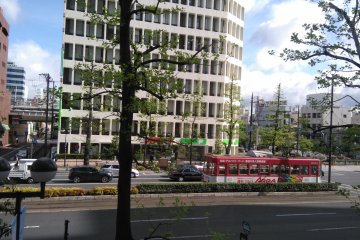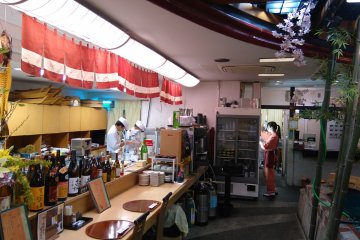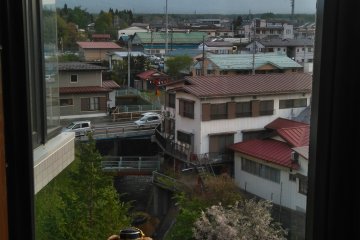Budget station hotels in Japan are near the stations, or at most a kilometer away, a walking distance of about 20 minutes. At average rates of between Y 5000 to 10000, they are a steal, if you can bear with no chocolates under the pillow and no rose petals strewn across the bed. What they provide is a standard no frills functionality.
In a single room, the marvels of Japanese creativity are manifest in how they have squeezed in a TV, luggage space, desk, two chairs, cupboard, bathroom and amenities, bed, and even a mini-fridge. They are safe, no creepy feeling. Fellow inmates are commonly school and community groups, families, business persons. The middle floor will usually hold a vending machine, water cooler, even a coin-operated laundry. Space is tight, and there will be the occasional thread-worn carpet, or walls need in need of paint, but maybe what matters more is that after a day’s gallivanting, you know you are coming back to a spotlessly clean room, a comfy bed with fresh linen and towels, and a hot meal at the hotel restaurant or conveniently nearby.
With their proximity to train stations, many of these hotels are at the hub of the action and attractions. Supermarkets are usefully near, with discounted food after five or six pm. These hotels are popular and must be booked early. If your hotel is booked, get a standby with no cancellation fee. Keep trying the hotel of your choice, because sometimes vacancies miraculously appear. Be careful, though, not all station hotels are budget beauties. Tokyo Station Hotel is a historical icon built in 1915, and charges accordingly. The Granvia chain are all directly annexed to many train stations. Tempting, tempting, but if you book a budget hotel, you can stay three days, compared to one day at the Granvia.
Budget station hotels can be counted on for uniformity and consistency, but each is different, with a memorable feature, if not name. I have encountered names like Benefit, Smile, High Up, Comfort Inn, Dormy Inn, Monterey Grasmere, Avanti, Terminal (I stayed there and did live to see another day), Intelligent, and not to be outdone, Grand Intelligent! However, the Zurich Toho 2001 must surely be the winner.
I will mention three memorable hotels. The Okayama Washington Plaza served a buffet breakfast of warm Danish pastries, juice, milk, coffee, in the café facing the street where you could watch the old fashioned trams pass. They are also generous with umbrella loans. At the Kurashiki Station Hotel, the restaurant’s centerpiece was a boat-shaped fresh fish tank, complete with fishing accoutrements. Fujisan Station Hotel in Fujisan had room views of Mt Fuji. It was located five minutes from the bus and train station which took you to Mt Fuji and the Five Lakes.
Even smaller towns, perhaps due the Japanese veneration for history, will possess something of value, either a temple, shrine, a 1000 year old camphor tree, rocky remnants of a castle, or, believe it or not, a shriveled tree trunk. This keeps people in constant move through the towns and through the stations. Railway stations provide the connection and the budget hotels a happy way of access to convenience and comfort.
This personal account is based on my experience with budget station hotels in Honshu and Hokkaido.









